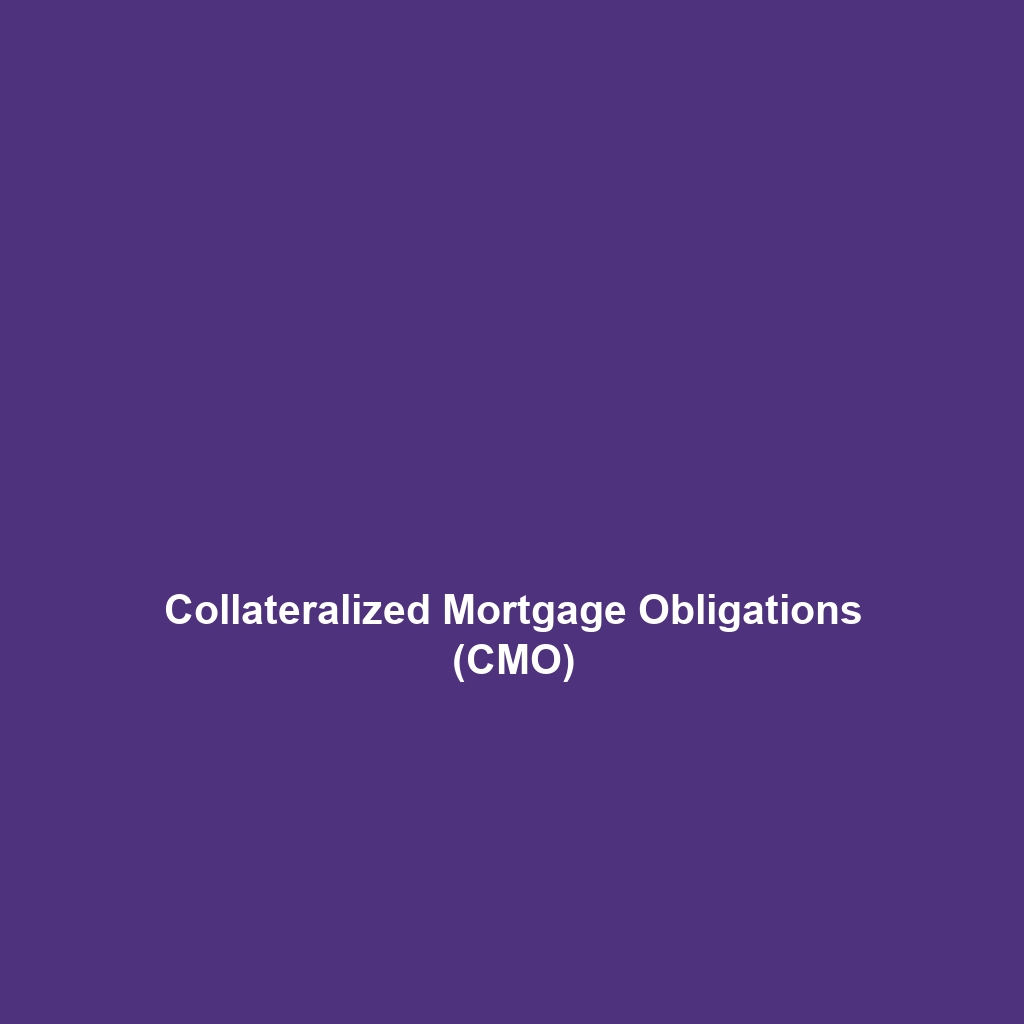Your cart is currently empty!
Tag: real estate finance

Collateralized Mortgage Obligations (CMO)
Collateralized Mortgage Obligations (CMO): An In-Depth Analysis
1. Overview
Collateralized Mortgage Obligations (CMOs) are a specific type of mortgage-backed security (MBS) that plays a pivotal role in the financial markets. CMOs are structured securities that pool together a collection of mortgage loans, allowing investors to purchase shares in the income generated by those loans. Unlike traditional mortgage-backed securities, CMOs offer varying levels of risk and return by dividing the pooled mortgages into different ‘tranches’ or slices, each with its own cash-flow characteristics. This structured approach to mortgage securities aids investors in managing risk while providing essential liquidity to the housing finance market.
2. Structure and Function
The mechanics of CMOs begin with the pooling of mortgage loans, which are typically secured by residential properties. These loans are then securitized, meaning they are converted into tradable securities that can be sold to investors. The process involves several key steps:
- Pooling: Mortgage loans with similar characteristics are grouped together. This pooling helps diversify risk because the underlying mortgages may have different payment schedules and risk profiles.
- Securitization: Once pooled, the mortgages are packaged into bonds and structured into various tranches. Each tranche has distinct features, such as maturity dates and interest rates.
- Cash Flow Distribution: Cash flows from the underlying mortgage payments are distributed to investors according to the tranche structure. The senior tranches receive payments first, while the junior tranches take on more risk but may offer higher potential returns.
- Servicing: A mortgage servicer manages the loans, collecting payments from borrowers and distributing them to investors.
This structural design allows investors to better manage their exposure to interest rate fluctuations and borrower default risks, making CMOs an attractive investment option for various financial institutions.
3. Market Dynamics
The value and performance of CMOs are influenced by several economic conditions and interest rate trends:
- Interest Rates: CMOs are sensitive to changes in interest rates. When rates rise, the prices of existing bonds typically fall, which can impact the value of CMOs. Prepayment risk also increases as borrowers may refinance their mortgages when rates drop.
- Housing Market Trends: The health of the housing market directly affects CMOs. An increase in housing prices can lead to lower default rates, thereby benefiting CMO investors.
- Economic Conditions: Macroeconomic factors, including employment rates and consumer confidence, significantly influence mortgage performance and, consequently, CMO stability.
Understanding these dynamics is crucial for investors looking to navigate the CMO market effectively.
4. Benefits and Use Cases
Investing in CMOs comes with several benefits that appeal to a range of investors, including institutional investors and pension funds:
- Diversified Cash Flow: CMOs provide investors with a diversified stream of income, allowing them to benefit from multiple mortgage payments rather than relying on a single borrower.
- Customizable Risk Profiles: With various tranches available, investors can select CMO slices that align with their risk tolerance and investment objectives.
- Potential for Enhanced Yields: Junior tranches often provide higher yields, appealing to investors willing to accept a higher level of risk for greater returns.
- Secondary Market Liquidity: CMOs tend to have strong liquidity, allowing investors to buy and sell them in a well-functioning secondary market.
These benefits make CMOs an attractive option for savvy institutional investors looking to diversify their portfolios and optimize returns.
5. Risks and Limitations
While CMOs offer various advantages, they also come with inherent risks that investors must consider:
- Prepayment Risk: If interest rates decline, borrowers may refinance, leading to early repayments. This can significantly impact the cash flows of CMO tranches, particularly those with lower yields.
- Default Risk: In the event of economic downturns, borrowers may default on their mortgages, affecting the performance and payments to CMO investors.
- Market Volatility: Like other securities, CMOs can be subject to market fluctuations, which may affect their value and attractiveness.
- Complexity: The structure and mechanics of CMOs can be complex, requiring a deep understanding of the underlying risks and cash flow dynamics.
Investors need to rigorously assess these risks to make informed decisions when considering an investment in CMOs.
6. Key Markets and Investors
CMOs are primarily traded in well-established financial markets, including the United States, where they were initially pioneered. Major financial institutions, including commercial banks, investment firms, and insurance companies, play vital roles in this market. Key investors in CMOs include:
- Pension Funds: Seeking stable returns, pension funds often invest in CMOs due to their income-generating potential.
- Asset Managers: Many asset management firms include CMOs in their fixed-income portfolios to enhance yield and diversity.
- Insurance Companies: Insurers value CMOs as they provide predictable returns that assist in meeting long-term liabilities.
The presence of diverse investors reinforces the stability of the CMO market.
7. Conclusion
Collateralized Mortgage Obligations (CMOs) play an essential role in the financial system by enhancing liquidity in the mortgage market and offering investment opportunities for various institutional investors. Understanding the structure, functioning, benefits, risks, and market dynamics associated with CMOs is key for investors aiming to navigate this complex but rewarding financial instrument. As the landscape of mortgage financing continues to evolve, CMOs will likely remain a fundamental component of fixed-income investment strategies.
Discover more sustainable financial solutions at UpCube.net.
